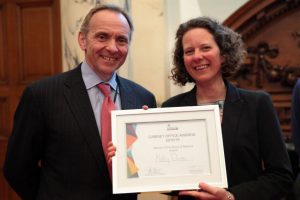
Around three years ago, I was experiencing a lot of stress at work. I was successful, hard-working and ambitious, but I was also highly-strung, anxious and impatient. I realised that my job could always be stressful and that I needed to change my perspective towards it to overcome that. A couple of friends had mentioned mindfulness, so I thought I’d give it a go and did a 4-week online course.
Before this, the idea of sitting in silence for 10 minutes terrified me. I liked being busy and active and definitely didn’t think I was the type of person to meditate. But I very quickly saw the benefits for me – and those I interact with – and I’ve been hooked ever since.
A definition
Jon Kabat Zinn, Emeritus Professor of Medicine at the University of Massachusetts Medical School, defines mindfulness as, “paying attention in a particular way; on purpose, in the present moment, and non-judgmentally”.

It’s such a simple concept, but it’s been totally transformational. For me, it’s as important as exercise, healthy eating and getting enough sleep. It’s about taking personal responsibility for my physical and mental well-being. As well as making me a happier person, I think it’s made me much better at my job. My boss must agree, given that he nominated me for the Cabinet Office Above and Beyond award for promoting the benefits of mindfulness!
5 benefits
The research into mindfulness is growing daily. It’s clear that it creates new pathways in the brain that drive our behaviours. There’s lots of impressive evidence of the positive impact on our physical health, but here are 5 main benefits that relate to the workplace:
- Dealing with ambiguity - in the Civil Service we often have to work through periods of uncertainty, this can lead to stress and anxiety for those personality types who, like me, prefer order. Mindfulness is paying attention to the current moment with care and curiosity. By practising this regularly we create a different relationship with ambiguity, seeing it as temporary and part of a process towards a solution, making it easier to be with.
- Decision-making - in the Civil Service we often have to deal with complex systems; mindfulness can improve cognitive effectiveness, including memory and the ability to focus and pay attention. It can also enable us to recognise and reduce unhelpful thought patterns and unconscious biases, such as sunk-cost bias, which might be driving decisions (Pykett et al 2016). Furthermore, it helps us to learn how to respond, rather than follow automatic reactions which can lead to more creative and innovate solutions.
- Managing stress - over time, mindfulness helps to create a non-judgemental attitude towards all of our experience, including stress. This boosts our resilience and makes it easier to manage stress and anxiety more effectively without resorting to longer hours in the office which can lead to burn-out, sickness and high absence rates.
- Leadership - Resilience, good decision-making and leading through times of uncertainty are important leadership traits. Furthermore, research has found that mindfulness traits among managers are positively associated with employee job satisfaction and performance (Reb et al 2014). This may be because mindfulness helps to improve our self-awareness and awareness of others.
- Work-life balance - The combination of these benefits make us more effective and efficient in our roles. They help us to prioritise more effectively and understand where, and how, we can add the most value. For managers, we can see improvements in the performance of our teams. This provides more space in our lives to focus on activities that nourish us outside of the workplace. This helps to boost our resilience, improve our wellbeing and make us happier in and outside work. And as we all know happiness makes us more productive (Oswald et al 2014). Who could argue with these benefits!
You may also like to...
If you want to find out more, come to see us on the mindfulness stands at all of the Civil Service Live 2016 events. Alternatively - or as well:
- download an app, there’s plenty to chose from, like Headspace
- do an online course, there are lots available, like Be Mindful
- there’s an array of books on the topic, I particularly like Finding Peace in a Frantic World
- attend a face-to-face mindfulness course, there are lots out there - do a google search to find one near you - but make sure your teacher complies with the code of practice for mindfulness-based teachers or is listed here.

6 comments
Comment by Jonathan posted on
Katy
It’s a good 6 months since you wrote this but just came across it. I have started to look at mindfulness recently and to practice (although I need to work on allowing 10 minutes a day as im a bit hit and miss). I also came across some extremely interesting information about positive, non-contradictory thinking. Intent = 100s of hours of action with only 17 seconds of uninterrupted positive thought, if the thought is based in the same or similar positive emotion of when the intent was formed. Go figure 🙂
Comment by Gavin Thomas posted on
Katy, Thank you for your interesting blog and congratulations on receiving a Cabinet Office Award. As a member of the FCO Staff Association Wellbeing Network, we have sought to promote the benefits of Mindfulness. During the recent Mental Health Awareness Week, we sought to promote mindfulness through singing and with the agreement of the FCO Choir Master Alex Hilton, we hosted an FCO Choir Mindfulness Open Rehearsal. Both Alex and I were extremely surprised by the level of interest and attendance and at the end of the rehearsal, quite a number of colleagues reflected on feeling more positive about themselves. So I would very much agree with your thoughts and comments above. Gavin Thomas
Comment by Vidyamala Burch posted on
Fabulous to see this Katy! Thanks for writing it.
Comment by Dakota posted on
If I were you I would be careful about saying whether happiness makes one more productive. Some of my best work occurred in the unhappiest times of my life. And there are people who suffer from depression, are they less productive? No, of course not.
Comment by Nancy Bailey posted on
Great article Katy, and great work! The benefits of mindfulness are endless so thanks for spreading the word. Hope you're well 🙂
Comment by Katy Owen posted on
Thanks Nancy, I hope you're well!